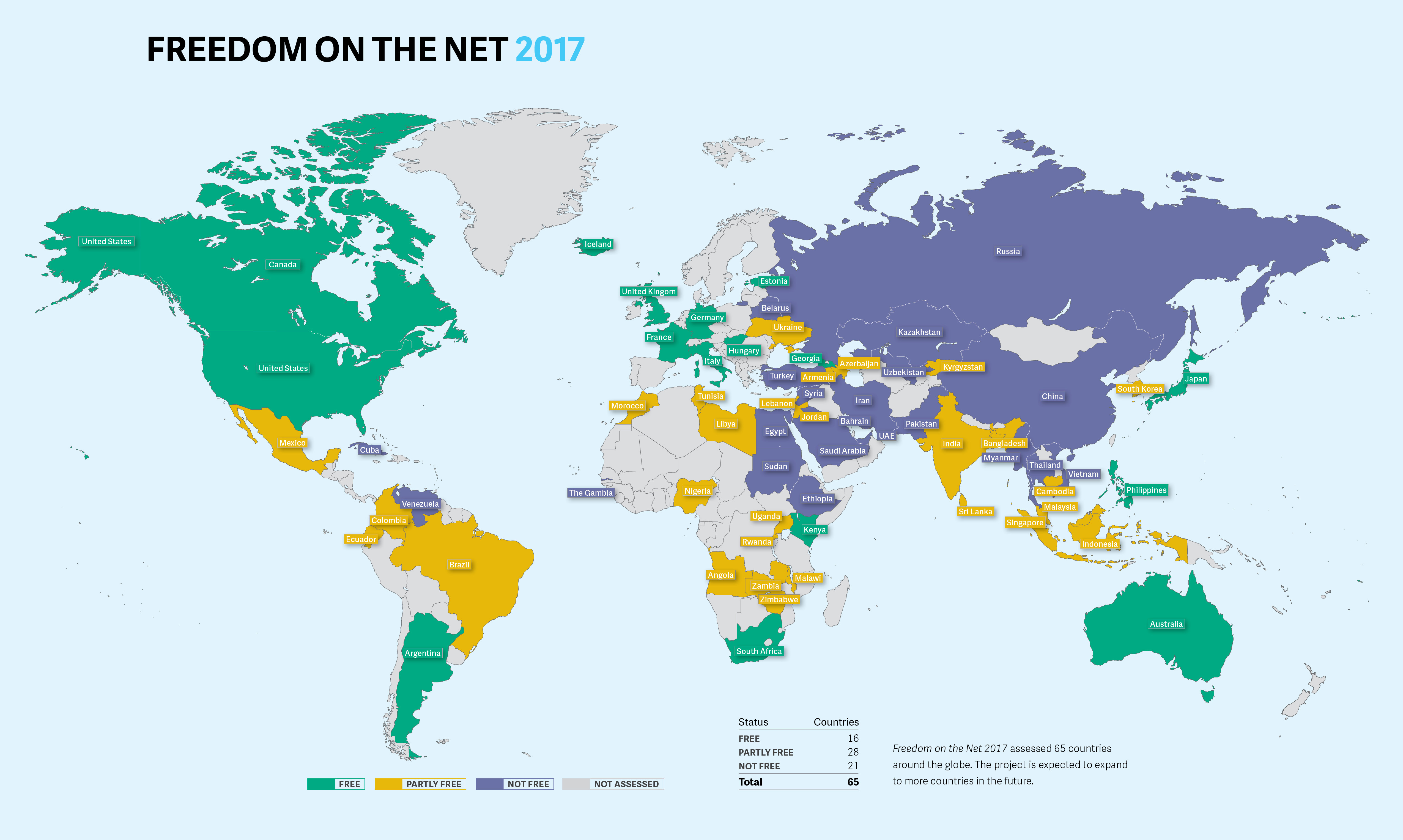Corporate Accountability News Highlights is a regular series by Ranking Digital Rights highlighting key news related to tech companies, freedom of expression, and privacy issues around the world.
New report finds increase in mobile network shutdowns, livestreaming and VPN restrictions

Freedom House graphic
Government-ordered mobile network shutdowns have reached a new high, according to Freedom House’s annual Freedom on the Net report, released last week. The organization found that half of the network shutdowns over the past year were mobile network-specific, and “often in areas populated by ethnic or religious minorities.” The report also identified a rise in the number of government restrictions on live video broadcasting platforms, particularly during political protests, and blocking Virtual Private Networks (VPNs), which may be used to circumvent censorship or browse the internet more securely. Research showed that 14 countries currently have some type of restriction on VPNs, with six of those countries having introduced new restrictions within the past year.
The increase in government efforts to control communications networks and to ban anonymous activity online poses risks to human rights around the world. Governments should respect and protect human rights, and work with the private sector and civil society to ensure that legal and regulatory frameworks enable companies to respect users’ freedom of expression and privacy rights. As noted in our Corporate Accountability Index, corporate accountability can only be achieved when governments are also held accountable.
Somaliland blocks social media during elections
The Somaliland Electoral Commission ordered telecommunications companies to block social media during presidential elections on November 13. The Commission said that the order would be in place until the election results were announced in order to prevent “fake news” and hate speech, according to Quartz. Blocked platforms include Facebook, Twitter, WhatsApp, Flickr, Instagram, LinkedIn, and Google Plus, Quartz reported.
Network shutdowns—which include orders for telecommunications companies to restrict access to specific protocols, services, or applications on the network—are a growing threat to human rights. As noted by Human Rights Watch, a joint declaration by intergovernmental organizations states that shutting down parts of or entire communications networks “can never be justified by law.” According to Access Now, “elections continue to trigger internet shutdowns in alarming numbers.” As noted in the Corporate Accountability Index, governments should commit to protect human rights principles and refrain from ordering network shutdowns, acknowledging that network shutdowns can pose a threat to public safety and have significantly detrimental economic effects. Telecommunications companies also have a responsibility to disclose what actions they are taking under whose authority so that those responsible can appropriately be held accountable. Of the ten telecommunications companies evaluated in the 2017 Corporate Accountability Index, none disclosed sufficient information about how they handle government shutdown demands.
YouTube broadens extremist content takedown policy
Reuters reports that YouTube has broadened its extremist video removal policy to include videos featuring groups or people that the U.S. or UK governments have designated as a terrorist. However, the videos do not necessarily include violence or hate speech, marking a shift in the company’s policy; previously, videos without hate speech or violence could be allowed, though they were displayed with a warning label. Although platforms including YouTube have been under increasing pressure to remove extremist content, lack of transparency about how these policies are enforced increases the risk of content being erroneously removed. YouTube has also been scrutinized recently for removing videos documenting the Syrian civil war. Activists have warned that this risks deleting records of human rights violations and inhibits efforts to bring them to international attention. In August 2017, YouTube restored thousands of Syrian conflict videos that it said had been removed “mistakenly,” after a few videos had been flagged by an automatic system attempting to detect extremist content.
As highlighted in our 2017 Corporate Accountability Index methodology, companies should have clear terms of service policies, including assess the freedom of expression risks associated with the processes and mechanisms used to enforce their rules for what types of content are permitted on their services. Companies should also develop effective grievance and remedy mechanisms to address users’ freedom of expression concerns and provide clear evidence that they are responding to complaints.



